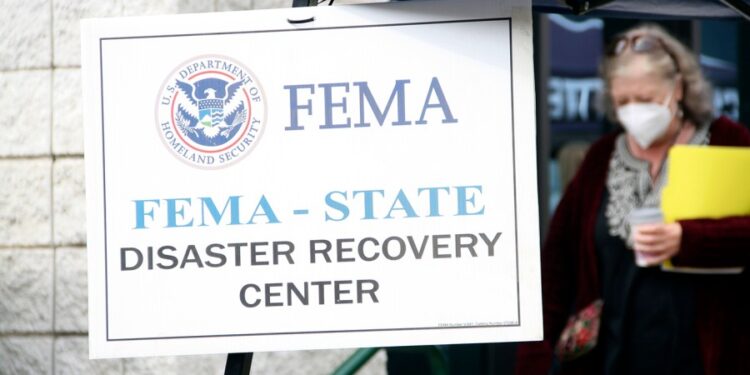
Republican lawmakers, including those from disaster-prone areas, are backing President Trump’s calls to overhaul the Federal Emergency Management Agency (FEMA).
“We need a FEMA that looks like somebody designed it on purpose, and that’s not what we have right now,” Sen. John Kennedy (R-La.) said this week. “It’s a mess, and it’s very inefficient.”
“I welcome the president’s interest in trying to improve the process of delivering disaster aid, which is taxpayer money, to people who need it,” he said.
Trump, who has been sharply critical of FEMA’s response to disasters during the Biden administration, indicated last week that he’d like to revamp — if not get rid of — the agency.
“I’ll also be signing an executive order to begin the process of fundamentally reforming and overhauling FEMA or maybe getting rid of FEMA,” he said. “I think, frankly, FEMA’s not good.”
He also said he wants disaster response to be run at the state level.
“FEMA is gonna be a whole big discussion very shortly, because I’d rather see the states take care of their own problems,” he told Fox News.
“I love Oklahoma,” he said. “But you know what, if they get hit with a tornado or something, let Oklahoma fix it and then the federal government can help them out with the money.”
Trump also issued an executive order establishing a FEMA review council that seeks to assess proposals to reform the agency.
Emergency managers and other policy experts have expressed concern about Trump’s calls to restructure — or even eliminate — the agency.
“That would be tough,” Lynn Budd, president of the National Emergency Management Association, said about FEMA potentially being axed.
“The solution is to improve the agency,” added Budd, who is also the director of Wyoming’s Office of Homeland Security.
FEMA is the federal agency in charge of coordinating responses to disasters. The agency does not work alone — supporting the response from state and local authorities.
“Their role during the acute phase of the disaster is huge,” said James Kendra, director of the University of Delaware’s Disaster Research Center.
He noted that the agency provides funding for state- and locally-run emergency operation centers.
FEMA’s website states that in the immediate aftermath of a disaster, the agency also deploys teams to communities to help people register for individual assistance. It provides grants to help fund things like debris removal as well.
Kendra noted that the agency also has funding and technical assistance programs that “run across all the phases of disaster.”
Andy Winkler, director of the Bipartisan Policy Center’s housing and infrastructure project, described FEMA as largely a “logistical operation.”
“It’s the coordinator of the federal response to any disaster. It helps local governments and states fill capacity gaps. It also provides a knowledge base for those officials who maybe haven’t experienced a disaster ever before or similar to what they’re experiencing,” he said.
The agency’s funds also support long-term recovery, helping communities to rebuild their infrastructure in the months and years after a disaster.
Sen. Lindsey Graham (R-S.C.), whose state was among those impacted by Hurricane Helene, expressed support for Trump’s order establishing a FEMA review council when asked to react to the president’s comments about the agency.
“When Helene came through, it was a mixed bag with FEMA. I just think taking a hard look at all these big ticket items is probably good,” he said.
“I don’t know if there’s a better model,” he added, “but you won’t know” unless you ask.
Sen. Thom Tillis (R-N.C.) also defended Trump.
“Everybody wants to draw the absurd conclusion, but I’ve had proposals to streamline FEMA and put more control in local governments since the first hurricane I had to deal with here,” he told reporters.
“If you look at some of the reform provisions that are out there expressing the money to the local governments … if that’s what he’s talking about, I’m all in,” Tillis said.
While Trump’s ultimate goal for FEMA is unclear, Shana Udvardy, senior climate resilience policy analyst at the Union of Concerned Scientists, noted that the president can’t simply eliminate the agency unilaterally.
“President Trump can’t single handedly abolish or reorganize FEMA overnight by signing another executive order,” Udvardy said. “He needs to go through Congress, and Congress needs to give him the authority under the Presidential Reorganization Act.”
However, she said, “the bad news is … Trump can refuse disaster funding through the disaster declaration process.”
Udvardy said that the agency provides “critical” personnel.
She said that response “takes people on the ground … they’re playing a lot of different roles.”
“Imagine a small rural area or a small town in North Carolina that’s just been devastated by extreme flooding and rainfall, and to ask them to handle that kind of disaster on their own … it’s really unconscionable,” she said.
Other policy experts said there are positive reforms that can be made at the agency — but that getting rid of it is not the answer.
“I think that the agency has been sort of overextended,” Winkler said. “I think kind of a reset on FEMA would be helpful, and taking a step back to think about what changes do need to be made would be helpful.”
“I’m not saying that every criticism is fair or valid, but they definitely have been understaffed, misunderstood and overburdened in recent years,” he added.
Budd, with the Wyoming Office of Homeland Security, said that allowing funds to roll over from one disaster to another and simplifying the application for aid could improve responses to disasters.
But ultimately, she said, “the partnership with FEMA is extremely important, and we have to find a way where we can do both things: support the states and have good accountability with the citizens of our nation.”







